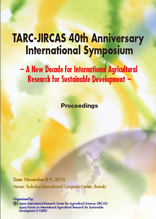Searching for A New Direction of Collaboration in JIRCAS

This presentation aims to review 40 years of experience in international collaborative research
by JIRCAS and its predecessor, the Tropical Agriculture Research Center (TARC), and to discuss the
future direction of JIRCAS activities in the context of the recent changes in international agricultural
research for development.
Forty years of experience
In 1970, when TARC was established to support Japanese governmental aid, research subjects
were selected based on the availability and expertise of individual researchers. They were separately
dispatched to research institutes in South and Southeast Asia as well as in Latin America. Although
60% of the research subjects was related to rice production, there was no explicit relationship among
those research subjects. In 1975, however, the need for building a structural relationship among
research subjects was already recognized; a trial of integrated production system research, in which
farm management research was also included, was started in the Muda area in Malaysia and in the
Cerrado area in Brazil. Reflecting the diversifying world agricultural market and post cold-war
political situation, the needs for grasping the research priorities for agricultural development had been
well recognized.
Changes in research for development
As global scale issues such as climate change and sustainable resource management came to be
highlighted in the 1990s, the needs for inter-disciplinary and broader scale researches became
appealing. The establishment of JIRCAS, which covers all agricultural ecosystems including fisheries
and larger geographical targets, was correlated with this global trend. JIRCAS initiated the so-called
‘comprehensive research projects’ in Vietnam, Brazil, China etc. Various research components were
incorporated in a project to solve specific problems. Participatory approach was also attempted. In
addition, the role of basic researches such as molecular biotechnology was acknowledged and inhouse
research facilities had been gradually strengthened to produce intellectual global public goods.
As a result of governmental reforms in 2001, JIRCAS was re-structured as an Incorporated
Administrative Agency. This legislation mandated JIRCAS to make its own priority-setting and to be
subject to external evaluation. Thus, research activities were re-organized towards a result-oriented
system. In 2006, JIRCAS’ whole research was structured as ‘research projects’ for which project
leaders were responsible for planning and implementation. As a consequence, new types of
collaboration which involved several counterparts in different countries, i.e. ‘networked research’ were
initiated.
New direction of research collaboration
From April 2011, JIRCAS will enter into its third mid-term plan period. It is now planning to
organize new research projects under an umbrella of ‘programs’ which correspond to the global
development issues such as sustainable resource management, food security and rural livelihood. Thus,
each research project can explicitly explain its role in achieving the overall goals to which JIRCAS
aims to contribute. Global agricultural situation is ever-changing and new research agenda are
endlessly emerging. The role of public research has to be redefined while considering the development
of markets and private sectors in the developing regions. Accountability must be attained for the sake of effectiveness of public investments. New direction for a new decade must be established based on
the successful 40 years worth of experience of face-to-face and long-range partnerships with
developing countries.
| Date of issued | |
|---|---|
| Creator | Osamu Koyama |
| Subject |
Research for development international agricultural research public research research network |
| Publisher | Japan International Research Center for Agricultural Sciences |
| Available Online | |
| Issue | 2010 |
| spage | 38 |
| epage | 48 |
| Rights | Japan International Research Center for Agricultural Sciences |
| Language | eng |
